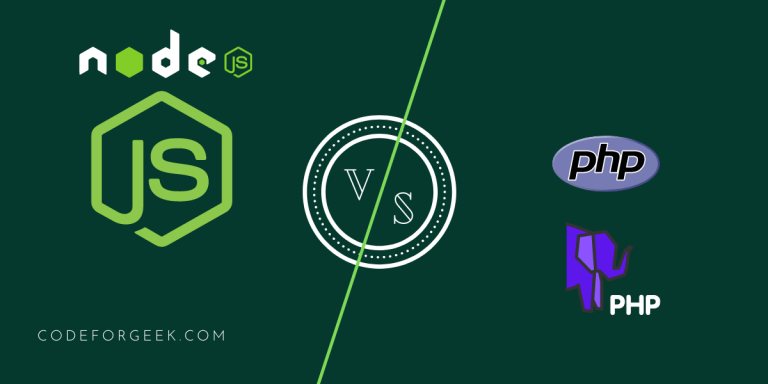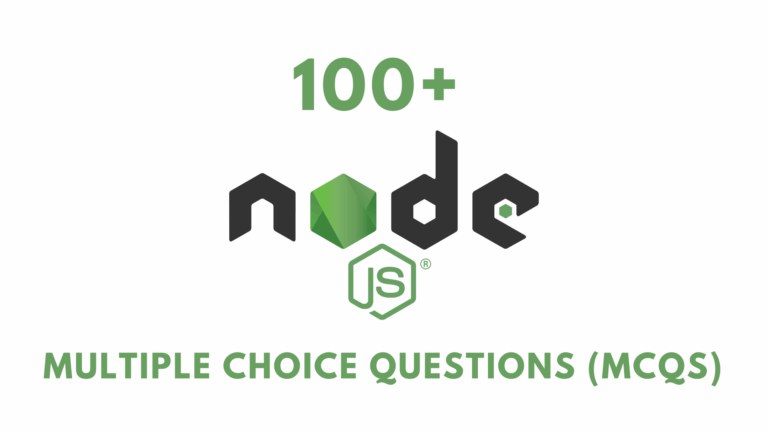New to Rust? Grab our free Rust for Beginners eBook Get it free →
Nodejs vs PHP: Choosing the Best Backend Technology in 2021

It’s time for a comparative study between the two most powerful backend technologies; Nodejs vs PHP.
A few posts back, I conducted a comparative study on Node.js and Python if you’re interested in Python. But let’s get to our topic of today!
PHP and Node.js are two popular and powerful technologies most developers prefer for the backend. Among the two, PHP is older and hence, well established. Obviously, it has a larger community with multiple big projects.
By the passage of time, PHP lacked relevant and up-to-date projects. However, this is exactly where Node.js beats PHP giving users a strong base for building ultramodern applications.
As a matter of fact, your choice of a programming language depends on what type of application you are building, what will be its requirements, functionalities, features, and a lot more. Whatsoever, developers still want a comparison.
Let me take you through this beginner’s Nodejs vs PHP comparison guide to help you choose the right technology for your awesome application!
Nodejs vs PHP: Synopsis
Both PHP and Node.js are widely used server-side (backend) technologies although, both of them were created at different times and for different objectives.
PHP, also known as Hypertext Preprocessor, was founded in 1994 by Rasmus Lerdorf. It was built as a server-side programming language and is open-source. Research conducted by W3Tech reveals that 78.9% of websites still use PHP. That means 8 out of 10 websites you visit on the internet have PHP code.
To top it all off, Facebook, the social media giant, was first written in PHP. With the evolution of content management systems like WordPress, Drupal, Shopify, and more, PHP has gained its popularity ever since.
Being around for almost 30 years now, it has a plethora of libraries, tools, and projects available.
On the other hand, Node.js, founded in 2009 by Ryan Dahl, was introduced as a JavaScript runtime that morphed the use of JavaScript on the server-side. Its event-driven approach makes projects scalable and efficient. Most Node.js developers prefer JS for both backend and frontend development.
Today, almost 20 million websites use Node.js, which is quite decent.
Nodejs vs PHP: In-depth Comparison
To get accurate results, we must study at least one criterion. As we look forward to making a crucial decision of selecting the best technology for the backend, we will consider multiple criteria to arrive at a decision.
Let the Nodejs vs PHP battle begin!
Ease of Coding
You’ll be able to do more with fewer lines of code if the programming language’s smooth, easy, and well-structured.
Node.js
Node.js might seem to have too many lines for a simple operation compared to PHP. However, since the technology is built on JavaScript, you totally do not have to remember any of that clunky syntax!
So, all in all, it is just a single language you work with throughout your application, on the client-side and server-side, which gets easier.
I first started coding with PHP and later switched to Node.js. Well, not because I wasn’t comfortable with PHP, I just couldn’t find a better tutor for myself :/.
My experience with the Node.js syntax wasn’t as great, being a newbie.
PHP
PHP programming language has flourished and become well-established over the years.
Although it seems PHP’s operations require lines of code and easier, it still requires efforts to acquire fluency when working with operators and generators in WAMP (Windows, Apache Server, MySQL or MariaDB, PHP), LAMP (Linux, Apache Server, MySQL, or MariaDB, PHP) or MAMP (MAC, Apache Server, MySQL or MariaDB, PHP), etc.
However, as a beginner programmer with a Marketing degree, I began coding with HTML, CSS, and PHP, for WordPress theme development. Surprisingly, within 4-5 days, I found myself way too comfortable with the syntax and architecture.
Winner: PHP
Community
A community is essential for every technology, today. A community refers to the users and developers that use the technology. Members in a community help other developers (and non-developers too sometimes) solve issues or contribute to the technology.
Active members keep updating popular projects and libraries, add new features and do a lot more!
Node.js
Many of you who do not know much of Node.js, might assume that since Node.js is still in its nascency, its community must be quite small. Well, you’d be surprised to learn that it has a vast and globally active community with experienced members!
PHP
Being around longer than most programming languages, PHP has its community well established and populated. It has a huge number of projects. However, the only problem here is, there aren’t any newer projects coming up.
At first, the flood of projects was received well for adding capabilities and features to PHP, that existed in other technologies. However, this resulted in too many similar projects.
It’s a tie!
Frameworks
Frameworks and libraries help developers use a code for something, without having to recreate it all by themselves, from scratch. Frameworks, libraries, and packages are the reason why technologies gain popularity and capabilities.
With help of a framework, you can simply add code to your project and modify it as per your requirements.
Node.js
Libraries in Node.js are managed by the Node Package Manager. It has the most comprehensive and well-documented library. With more than 1.5 million NPM packages, it is the world’s largest package repository in the world.
Node.js also has popular and powerful frameworks under its belt, such as ExpressJS, MeteorJS, and Derby, that boost productivity, save time, and impressively reduce resource consumption!
PHP
PHP too has multiple popular and powerful frameworks like Laravel, CakePHP, StormPHP, Symfony, CodeIgniter, and many more. However, frameworks in PHP were designed to add features like non-blocking which is inherent in Node.js.
So, here, Node.js is the clear winner!
Winner: Node.js
Performance & Speed
The architecture and features of technology have an impact on the speed and performance of applications created with them. The better the speed and performance a technology serves, the higher chances for its win!
Node.js
Node.js’ non-blocking architecture makes the execution process simpler and faster. To top it all off, your code is executed outside the web browser.
This way the app on the web browser runs faster and performs better making it more efficient. This also allows the web app to pull features like TCP sockets, which are normally unavailable in browsers.
Moreover, Node.js’ single module caching feature makes applications run faster and responsive.
PHP
Like most technologies developed in the pre-millennial era, PHP takes the synchronous approach for executing its operations. This results in the execution of every module and function, in a specified order i.e., one after other and not altogether, as in the asynchronous approach.
This results in a slower application.
Winner: Node.js
Hosting
The section covers how much the technology is compatible with different hosting service providers. The better speed and security offered by technology, that becomes the winner.
Node.js
Node.js comes with a huge range of alternatives. Joyent provides a SmartOS system that is great for debugging, deploying, and performance betterment. Heroku and Nodejitsu are easy to use and best for beginners.
PHP
With 79% of the internet preferring PHP, this seems to be the major reason why! The LAMP and WAMP stacks meet the needs of many hosting servers. However, LAMP isn’t as secure for hosting. But still, there are ways you can enhance your app’s security and curb the problem.
Winner: PHP
Conclusion
It’s time for a comparative study between the two most powerful backend technologies; Nodejs vs PHP. PHP and Node.js are two popular and powerful technologies most developers prefer for the backend.
If you want to read more posts like Nodejs vs PHP, comment below!
Noteworthy References
Nodejs vs PHP – Simform
Nodejs vs PHP: Which One to Choose in 2021 – ThirdRockTechKno




